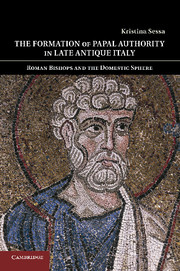Book contents
- Frontmatter
- Contents
- Acknowledgments
- Abbreviations
- Map Late Roman Italy
- Roman Bishops from Peter to Gregory I
- Introduction: Household Management and the Bishop of Rome
- Chapter 1 The Late Roman Household in Italy
- Chapter 2 From Dominion to Dispensatio: Stewardship as an Elite Ideal
- Chapter 3 Primus Cultor: Episcopal Householding in Theory and Practice
- Chapter 4 Overseeing the Overseer: Bishops and Lay Households
- Chapter 5 Cultivating the Clerical Household: Marriage, Property, and Inheritance
- Chapter 6 Mistrusting The Bishop: Succession, Stewardship, and Sex in the Laurentian Schism
- Chapter 7 The Household and The Bishop: Authority, Cooperation, and Competition in the Gesta Martyrum
- Conclusion
- Bibliography
- Index
- References
Introduction: Household Management and the Bishop of Rome
Published online by Cambridge University Press: 05 December 2011
- Frontmatter
- Contents
- Acknowledgments
- Abbreviations
- Map Late Roman Italy
- Roman Bishops from Peter to Gregory I
- Introduction: Household Management and the Bishop of Rome
- Chapter 1 The Late Roman Household in Italy
- Chapter 2 From Dominion to Dispensatio: Stewardship as an Elite Ideal
- Chapter 3 Primus Cultor: Episcopal Householding in Theory and Practice
- Chapter 4 Overseeing the Overseer: Bishops and Lay Households
- Chapter 5 Cultivating the Clerical Household: Marriage, Property, and Inheritance
- Chapter 6 Mistrusting The Bishop: Succession, Stewardship, and Sex in the Laurentian Schism
- Chapter 7 The Household and The Bishop: Authority, Cooperation, and Competition in the Gesta Martyrum
- Conclusion
- Bibliography
- Index
- References
Summary
Roman episcopal leadership in late antiquity has typically been studied as a public or civic phenomenon, and as a chapter in the inexorable “rise of the papacy.” This book presents a new approach. Instead of charting the growth of an exceptional ecclesiastical government or the popes’ efforts to remake Rome into a Christian city, it examines the attempts of Roman bishops to anchor their authority in domestic life. During late antiquity, the popes faced a fundamental and daunting task: to persuade an exceptionally rich and high-status community of Italian Christians to trust their judgment in some of the most central matters of the household, from marriage, sexual relations, and slavery to property administration. To establish their reputations as strong spiritual leaders, Roman bishops had to convince their congregants, including their own clergy, that they possessed a special expertise in the art and science of household management. Domestic life and models of governing, this book argues, were central to the formation of papal authority in late Roman Italy.
Elite households offered the Roman church a variety of resources – material, political, and social – that gave new meaning to the power and stature of its bishops, as Charles Pietri and others have shown. The household, however, also played a formative cultural role in the making of episcopal authority. The ancient household was not a marginal female space only obliquely relevant to the governing of city and state. It was a highly masculine institution, the empire's primary unit of production and wealth, and the most morally revealing realm with respect to the character and capacities of its leaders. In antiquity, estate management (oikonomia) was a discourse, a system of ideas and practices associated with the running of a large aristocratic household. The system encompassed everything from administering property and disciplining dependents to the oversight of justice and religious order within the home. Oikonomia was also a dynamic discourse that underwent revision in the hands of Christian moralists. The following chapters show how late ancient discourses of household management shaped not only the rhetorical presentation of Roman episcopal authority but also its concrete practice.
- Type
- Chapter
- Information
- The Formation of Papal Authority in Late Antique ItalyRoman Bishops and the Domestic Sphere, pp. 1 - 34Publisher: Cambridge University PressPrint publication year: 2011



